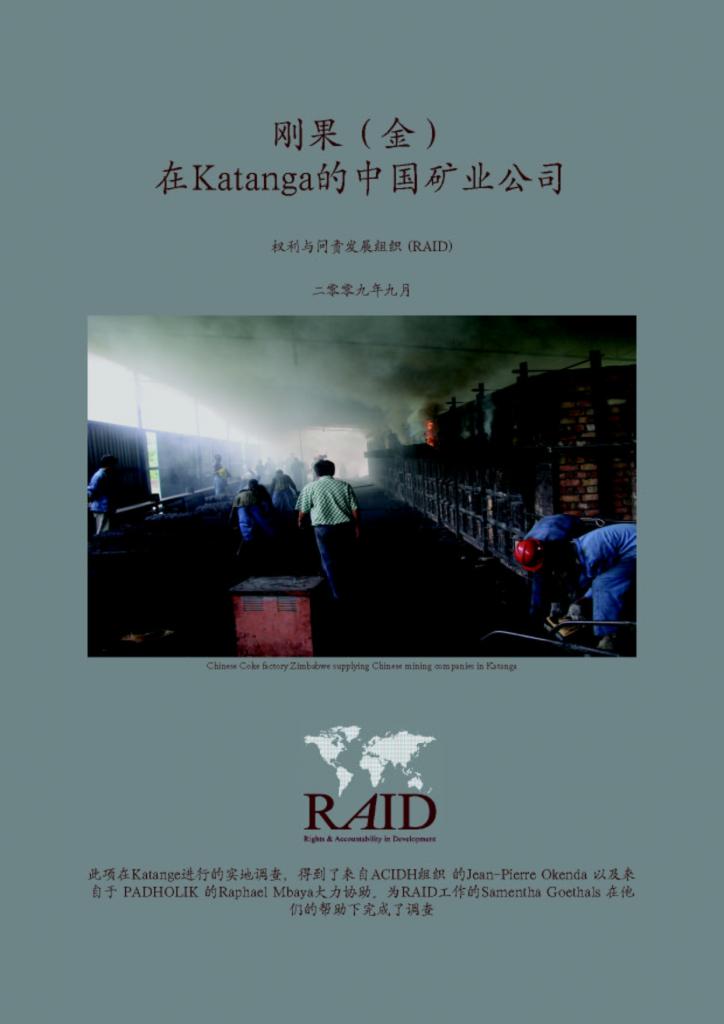
A report, Chinese Mining Companies in Katanga, released today (Tuesday 29th September 2009) by Rights and Accountability in Development (RAID) is the first-ever survey of its kind, providing a snapshot of working conditions in Chinese-run enterprises in Katanga, in the Democratic Republic of the Congo (DRC). More than 60 of Katanga’s 75 smelters and processing plants are owned by Chinese companies; 90 per cent of the region’s minerals go to China. Over 15 per cent of Chinese mining operators in Katanga Province were covered in RAID’s study.
Congolese workers were asked to compare Chinese and non-Chinese companies. Few had anything positive to say about conditions in Chinese processing plants, which were ranked bottom, on a level with Congolese companies. Conditions in European and US companies were rated much higher. The results indicate an overwhelmingly negative perception of Chinese companies in Katanga:
- They flout Congolese laws and do nothing to protect the environment
- They are not transparent
- Their approach to safety is abysmal
- They don’t pay sick leave or compensate injured workers
- They demand excessively long hours from workers for low pay
- They are abusive and arbitrary employers
- They rely almost exclusively on illegally-sourced minerals and profit from the misery of artisanal miners
- They do not have a commitment to social development
The Congolese, mostly day labourers, unable to trust the authorities or the courts to uphold their rights, have no remedy against these abuses. According to Patricia Feeney, RAID’s Executive Director:
“The Chinese Government insists that their companies respect local laws but that’s just empty rhetoric. Despite widespread abuse, no action has been taken by the Chinese authorities to improve the conduct of their companies. China is a global economic power but its companies act like carpet-baggers. China urgently needs to address this issue.”
RAID’s survey shows that the Chinese policy of turning a blind eye to these problems is backfiring and only fuels anti-Chinese resentment among the Congolese. The Chinese managers RAID interviewed talked about the hardships of life in Katanga:
- They are at risk of assault by gangs and are frequently robbed
- They are constantly harassed by Congolese officials, who extort money from them on the slightest pretext
- Unable to speak French or Swahili, they feel isolated and afraid
- Many Chinese come to the DRC on 2-year employment contracts with no home leave; many would prefer to work elsewhere.
- They feel their human rights are not respected; the Chinese embassy should do more to help.
Chinese managers did not feel they benefited from the high level expressions of friendship and cooperation between the Chinese and DRC Governments
Samentha Goethals, RAID’s researcher, explained:
“Houses where Chinese workers live are frequently and repeatedly burgled. Chinese workers find it almost impossible to go out alone and, as their passports have usually been confiscated by their managers, it would be risky to do so. When they are not working they spend their time cooped up in over-crowded rented accommodation or confined to guarded compounds.”
Corruption is pervasive in the DRC and Chinese enterprises are both the beneficiaries and victims of this system. Chinese companies complain that they are coerced into making large, often illicit payments to officials. None of this money is used to improve living conditions or infrastructure in Katanga.
“While the influence and interests of major Chinese companies cannot be ignored, the Chinese Government has a duty to ensure that its companies behave responsibly in the Congo and in conformity with international human rights and environmental standards”, said Patricia Feeney.
At the end of July 2009, an advance copy of the report was given to the Chinese Ambassador to the DRC in Kinshasa. RAID has not received any response.
ENDS
Copies of the full report (English only) and summaries (English, French and Chinese) are available at: www.raid-uk.org
